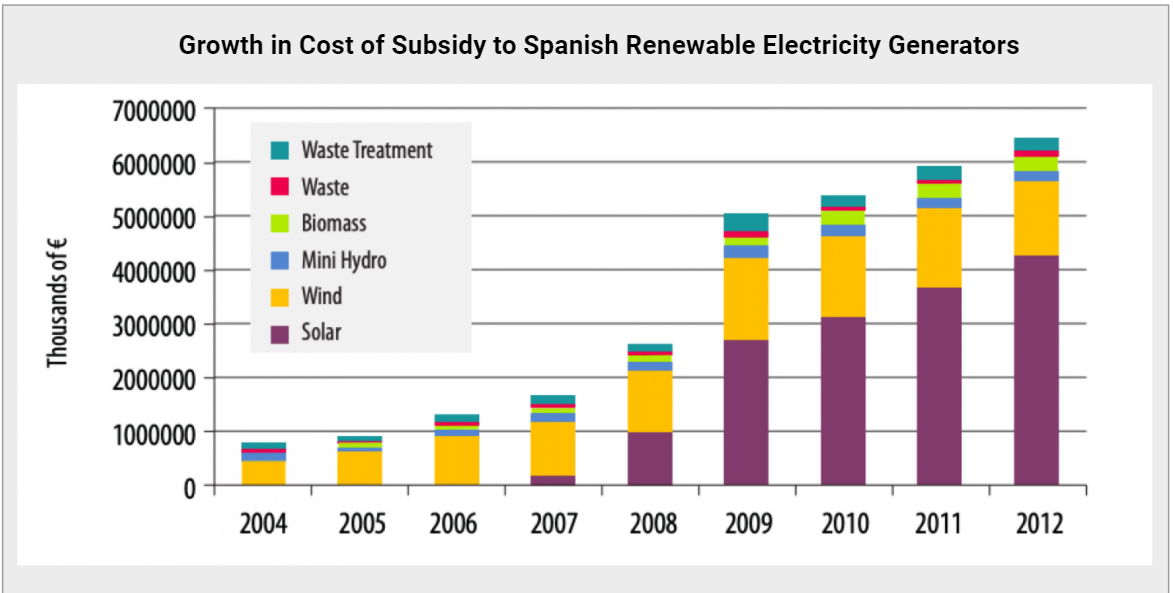
John Constable writes at Civitas The Green Mirage: Why a Low-Carbon Economy May be Further Off Than We Think. Excerpts in italics with my bolds and images. h/t Real Clear Public Affairs

Findings:
- The prospects for a sustainable, low-carbon economy as the result of current UK national and EU-wide policies are poor.
- Empirical experience in Spain and Germany shows that the costs of supporting renewable energy generation are too high.
- Rising employment in the renewable energy sector compared to the wider UK economy stems from unsustainably high subsidies.
- Renewables are naturally less productive, so as they are relentlessly pursued, a painful rebalancing of the economy will occur, with fewer jobs and less economic growth.

Bottom Line: The current prospects for a sustainable low-carbon economy are poor in both the UK and across the European Union (EU). Germany and Spain have already clearly shown what happens when state coercion forces such a dramatic shift to less reliable and more costly renewable energy systems: unsustainably high subsidies, fewer jobs, and reduced economic growth.
Whatever the longer-term potential for a viable and prosperous global economy with a low-emissions profile, the present study demonstrates that the prospects for a self-sustaining low-carbon economy as the result of current UK national and EU-wide policies are poor.
The problem is that these policies for such a shift to renewable energy systems demand high levels of state coercion. This has the risk of stagnating economic growth and leading to lower levels of invention and innovation, thus appearing to be a weak preparation for reduced usage of fossil fuels.
In addition, empirical experience in Spain and Germany shows that the costs of supporting renewable energy generation is overly high, compared to low-carbon alternatives, and almost certainly has, over time, net economic effects that are negative both in terms of gross domestic product and employment.
An age of subsistence energy generation appears to be dawning. Overly high subsidies to force renewable energy into the system erode jobs in other sectors of the economy.
Finally, analysis for the EU suggests that the net effects of such policies would only be marginally positive if the EU retains a high share of the world export market in renewable energy technologies – something that appears rather unlikely.
Read the full study here.
Footnote: Excerpt from the full study:
In an interview with an environmental journalist for Ecoseed in early 2011, a spokesman for the industry body ASIF (Asociación de la Industria Fotovoltaica) remarked ‘The government cheated the solar investors by changing the law after it has lured them to invest their money in PV power plants… If you know that the government would change the law, you will never have invested in that technology and never have put your money in that market’.22 This implicitly concedes that the sector was from the outset likely to be a long-term client of the state, unable to survive without support, and should serve as a warning to other governments hoping to create independent renewables industries through subsidy.

Reblogged this on Tallbloke's Talkshop and commented:
Wind is generating a mere 1-2% of UK electricity today, the cause being a high pressure weather system with very low wind speeds, which no amount of subsidy can ever prevent. Discuss.
LikeLike
Ron,
The report was written in 2010. Much water has passed under the bridge since then.
LikeLike
Yes, but the publication is no longer paywalled. And nothing has changed to overturn Constable’s conclusions, except that some places like Spain have started to see the light. Biden, not so much.
LikeLike